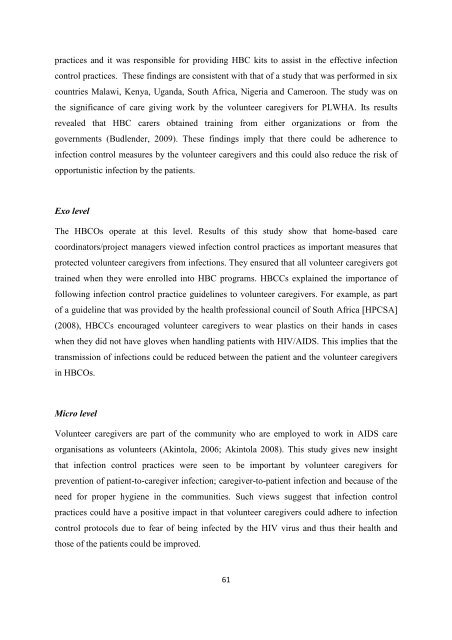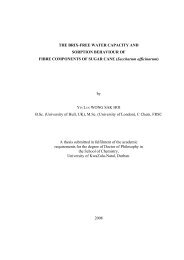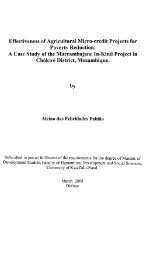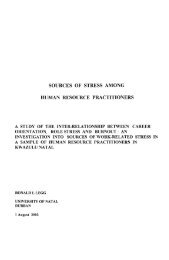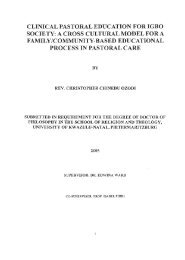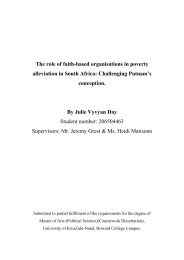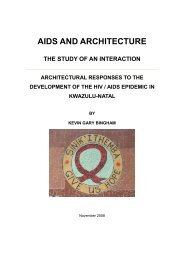View/Open - ResearchSpace - University of KwaZulu-Natal
View/Open - ResearchSpace - University of KwaZulu-Natal
View/Open - ResearchSpace - University of KwaZulu-Natal
You also want an ePaper? Increase the reach of your titles
YUMPU automatically turns print PDFs into web optimized ePapers that Google loves.
practices and it was responsible for providing HBC kits to assist in the effective infection<br />
control practices. These findings are consistent with that <strong>of</strong> a study that was performed in six<br />
countries Malawi, Kenya, Uganda, South Africa, Nigeria and Cameroon. The study was on<br />
the significance <strong>of</strong> care giving work by the volunteer caregivers for PLWHA. Its results<br />
revealed that HBC carers obtained training from either organizations or from the<br />
governments (Budlender, 2009). These findings imply that there could be adherence to<br />
infection control measures by the volunteer caregivers and this could also reduce the risk <strong>of</strong><br />
opportunistic infection by the patients.<br />
Exo level<br />
The HBCOs operate at this level. Results <strong>of</strong> this study show that home-based care<br />
coordinators/project managers viewed infection control practices as important measures that<br />
protected volunteer caregivers from infections. They ensured that all volunteer caregivers got<br />
trained when they were enrolled into HBC programs. HBCCs explained the importance <strong>of</strong><br />
following infection control practice guidelines to volunteer caregivers. For example, as part<br />
<strong>of</strong> a guideline that was provided by the health pr<strong>of</strong>essional council <strong>of</strong> South Africa [HPCSA]<br />
(2008), HBCCs encouraged volunteer caregivers to wear plastics on their hands in cases<br />
when they did not have gloves when handling patients with HIV/AIDS. This implies that the<br />
transmission <strong>of</strong> infections could be reduced between the patient and the volunteer caregivers<br />
in HBCOs.<br />
Micro level<br />
Volunteer caregivers are part <strong>of</strong> the community who are employed to work in AIDS care<br />
organisations as volunteers (Akintola, 2006; Akintola 2008). This study gives new insight<br />
that infection control practices were seen to be important by volunteer caregivers for<br />
prevention <strong>of</strong> patient-to-caregiver infection; caregiver-to-patient infection and because <strong>of</strong> the<br />
need for proper hygiene in the communities. Such views suggest that infection control<br />
practices could have a positive impact in that volunteer caregivers could adhere to infection<br />
control protocols due to fear <strong>of</strong> being infected by the HIV virus and thus their health and<br />
those <strong>of</strong> the patients could be improved.<br />
61


